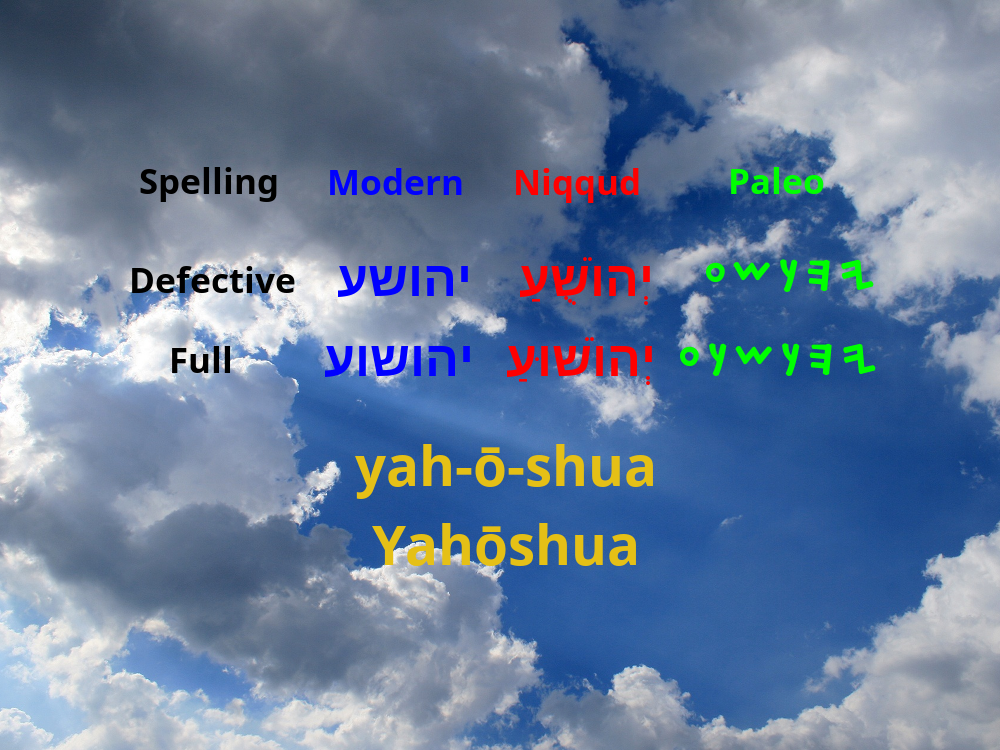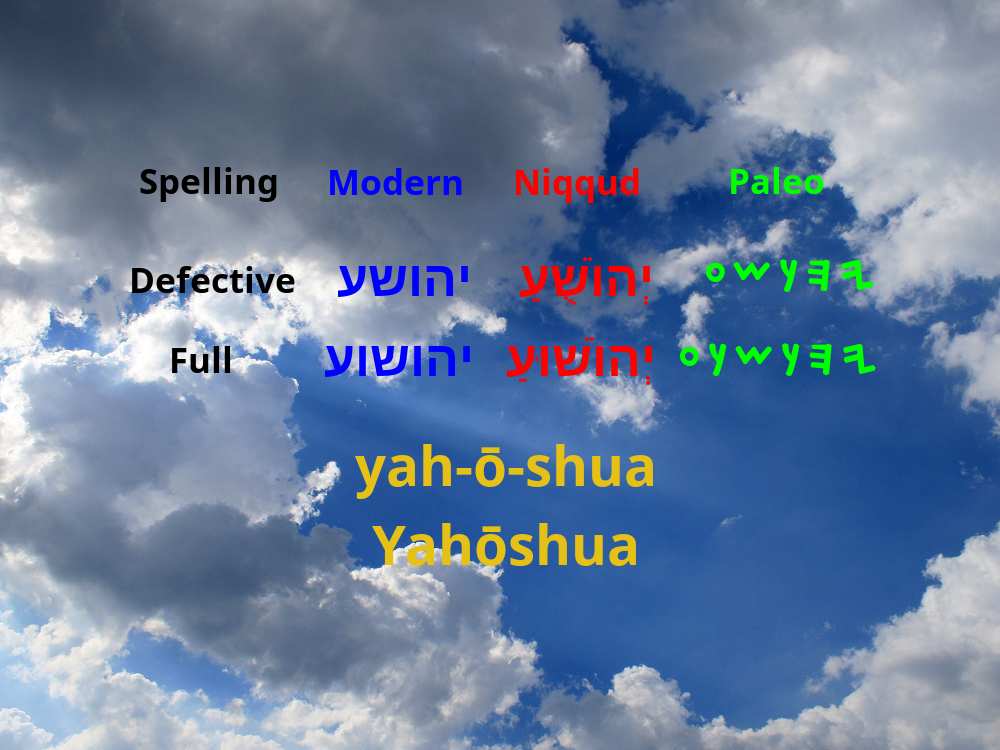We have seen many articles discussing the pronunciation of the name of our Messiah as either “Yahushua” or “Yahusha”. No doubt, some or many of us were already confused to the point that we placed it aside and decided “it does not really matter”.
But let us all be honest. We all want the truth. We are curious about the proper pronunciation of our Messiah’s name. It is only by His name that men can be saved, we heard that a lot, right? Here’s what my study and prayers led me to.
Before anything else, an important note. This study is on the advance level or for those matured in faith. If you prefer to use “Jesus”, “Jesus Christ”, “Hesus”, “Hesu Kristo”, it is fine. This study is not about which name and pronunciation is recognised in heaven but about the rules in linguistics. With that cleared, let’s begin.
The Masoretic marks (“niqqud”/“vowel points”) were developed to supposedly make it easy to determine the correct vowel pronunciation of Hebrew words. If we want to go back to the original, is it not only logical to write these “vowels” in full form when we remove it?
Our example is our Messiah’s name: יְהוֺשֻׁעַ becomes יהושוע. I submit that this is the proper way to remove the niqqud, we reverse the process of how they arrived into the niqqud form. (n.b. Our Messiah’s name is the same as what we know in English as “Joshua”.)
From ancient to niqqud form
- His name was originally written in "full spelling" in Paleo-Hebrew: 𐤉𐤄𐤅𐤔𐤅𐤏
- Later, they figured they can drop one character/glyph *without* changing the pronunciation, this is called "defective spelling": 𐤉𐤄𐤅𐤔𐤏
- Their writing script changed to what we know today as "square" or "blocky" Hebrew but there were no niqqud additions yet:
- Full spelling: יהושוע
- Defective spelling: יהושע
- Then the Masoretes arrived and developed the niqqud system. The "controversial" vowel markers:
- Full spelling: יְהוֺשׁוּעַ
- Defective spelling: יְהוֺשֻׁעַ
The purpose of the niqqud or vowel markers were simply to guide a person in pronunciation.
Modern Hebrew
The Hebrew language that we know today has dropped the use of niqqud in favor of the “full spelling” of the words. Instead of using vowel markers, they now use a real character/glyph to represent the vowel sounds. The same way as it was before the vowel marker system was invented.
However, people’s names stay as-is but without any niqqud. Example, if your name was written in defective spelling, it stays the same but without any vowel markers. But again, the pronunciation stays the same.
Using the name “Joshua” in Hebrew:
- יְהוֺשׁוּעַ is now יהושוע (full spelling), same characters/glyphs but without the niqqud, and never as the defective spelling
- יְהוֺשֻׁעַ is now יהושע (defective spelling), same characters/glyphs but without the niqqud, and never as the full spelling;
For children, who are obviously not masters of the Hebrew language yet, they use niqqud or vowel markers to help them in pronouncing the words correctly. They advise the same for foreigners.
If you have mastered the Hebrew language and your knowledge is vast about the rules, grammar, and vocabulary, you no longer need the vowel markers. You know the correct pronunciation of “defective spelling” words/names without any niqqud, and you know what a “full” and “defective” spelling is about.
Let’s break it down
Full spelling: יְהוֺשׁוּעַ / יהושוע
- יְ - yah (yad with the sheva niqqud)
- ה - h (hey)
- וֺ - ō (waw/uau with holam [haser] niqqud; long "o" sound, which sounds like a long "u" basically)
- שׁ - sh (shin-dot)
- וּ - u (waw/uau with shuruk niqqud)
- עַ - ah (ayin with a patach niqqud)
Defective spelling: יְהוֺשֻׁעַ / יהושע
- יְ - yah (yad with a sheva niqqud)
- ה - h (hey)
- וֺ - ō (waw/uau with a holam [haser] niqqud; long "o" sound, which sounds like a long "u" basically)
- שֻׁ - shu (shin-dot with a kubutz niqqud)
- עַ - ah (ayin with a patach niqqud)
Both spellings (defective and full) are pronounced and understood as:
- Original Hebrew: yah-u-shua
- Niqqud and Modern Hebrew: yeh-ō-shua
Yahushua, The Name Above Every Name
Infographic showing how the name of the Messiah is written in Paleo Hebrew, Modern Hebrew with Nikkud, and Present Hebrew
Yahushua, The Name Above Every Name by I’M YourOnly.One is licensed under CC-BY-SA 4.0 International.
How about the transliteration?
Personally, to help in educating our brethren about the proper pronunciation of Hebrew words and names, we should transliterate based on the actual, original pronunciation, which is called “phonemic transcription/orthography”. In our example, our Messiah’s name should be written as “Yahushua”. However, if you prefer to use “Yehoshua”, “Yehushua”, “Yahusha”, “Yehusha”, “Yeshua”, “Yesu”/“Yeshu” (Chinese), I personally do not see anything wrong with it, as long as you pronounce it as “yah-hu-shua” because that is how it is pronounced in Hebrew.
If you are not familiar with transliteration, especially if you are not an Asian or had no need to transliterate Asian languages and writing scripts, there are different paths in arriving to a transliteration of a name or word. “Phonemic transcription/orthography”, as mentioned earlier, is one of these.
In some languages, like the Chinese and Japanese, they have a standardized romanization system in place, usually approved by the government based on academic study and input.
The Japanese language, for example, have “Nihon-shiki” which is a romanization of Japanese kana syllables with 100% accuracy. Think Hebrew without vowel pointing. You need an extensive knowledge of the language to know the correct pronunciation.
They also have a phonemic orthography standard called “Hepburn romanization”, which allows non-Nihongo individuals to read and say Nihongo words accurately. We can equate this to the use of vowel pointing in Hebrew, which gives us a guide in pronunciation.
Unfortunately, Hebrew does not have a common standard for romanization of Hebrew language. In addition to that, there are different traditional and pronunciation variations for the same Hebrew characters/glyphs even today.
Obviously, we will indeed end up with different transliteration of Hebrew names and words. One person may favor this approach, while another favors the other. With that in mind, we should treat transliteration simply as transliteration. What is important is we pronounce Hebrew words and names correctly (if not properly).
For example, “Yahweh” is pronounced as “yah-wey” and not “yah-weh” as most say His name. Likewise, “Yahusha” and all other transliteration variations, should be pronounced “yah-u-shua”.
Always remember this, my brethren, there is no point arguing about which transliteration is correct. The fact that we are using a transliteration is itself the clue. We want to read and say Hebrew words/names and as such, we have to do it the Hebrew language way, not the English way, not your local language way.
If you think that it is a disrespect to write His name’s transliteration “wrong”, then better use Hebrew as you can never go wrong. Here it is for your copy-and-paste convenience:
- Full spelling in Paleo-Hebrew: 𐤉𐤄𐤅𐤔𐤅𐤏
- Defective spelling in Paleo-Hebrew: 𐤉𐤄𐤅𐤔𐤏
- Full spelling in Modern Hebrew: יהושוע
- Defective spelling in Modern Hebrew: יהושע
Disclaimer
- This is not an academic paper and should not be treated as such.
- This is my record of my personal journey in my faith as a Natsari/Messianic, sharing it hopefully to help our brethren.
- I am not claiming that my research and understanding is 100% correct. But I did my due diligence and prayer.
- Only use this as a possible guide. I highly encourage you to do your own study and decide independently.
- I am definitely not implying anything about the "Sacred Name (Movement)"; nor am I claiming or implying that we can only be saved by pronouncing His name correctly. This is, again, about linguistics. It is Hebrew and thus we should do it the Hebrew way, not English or any other language for that matter.
I hope with the disclaimers above, there will be no attempts to spark debates. You are free to comment and share your thoughts below in a constructive and civilized manner.
𐤉𐤄𐤅𐤄 (Yahuah) bless you, my brothers and sisters.


